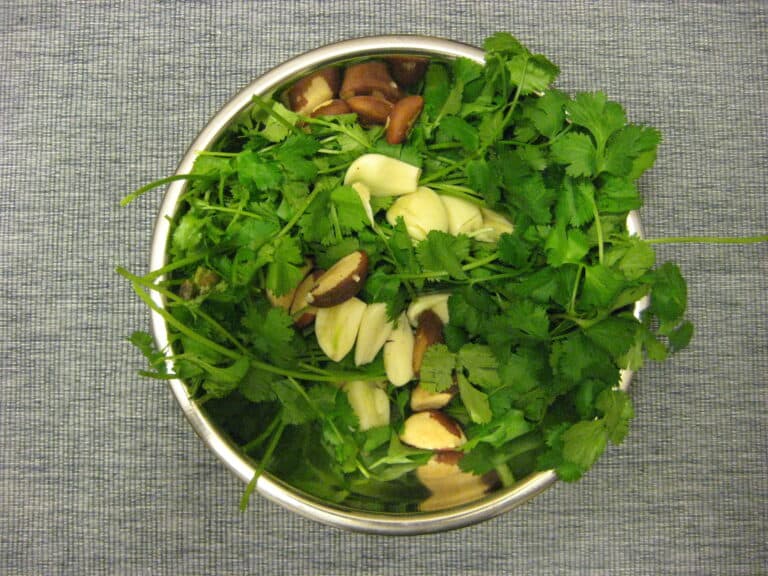Print


Food as Medicine: Liver & Immune Support Pesto
Enjoy 1 tablespoon, 2 times per day, for 3-4 days, when under heavier stress or fatigue. For therapeutic benefits throughout the year, enjoy regularly on your weekly meal plans. This pesto is excellent on eggs, stirred into soup, on top of whole grains, tossed with veggies, or simply spread on one piece of sprouted bread.
Full system support: And although I named this recipe ‘liver and immune support pesto’, as you can see from the purpose of each ingredient detailed below in the notes section, this pesto supports your whole system.
- Total Time: 10 minutes
- Yield: 8 1x
Ingredients
Scale
Core Ingredients
- 4 cups fresh cilantro (1 large bunch)
- 2 garlic cloves, (more if desired)
- 1/4 cup walnuts (raw, unroasted)
- 1/4 cup Brazil nuts (raw, unroasted)
- 1/4 cup pumpkin seeds (raw, unroasted)
- 2 tablespoons extra virgin olive oil
- 1/4 cup shredded parmesan cheese
Optional (ingredients harder to find but worth the search)
- 1 tablespoon miso paste (probiotic fermented soy paste)
- 1 tablespoon dulse flake, optional (dried sea vegetable flake)
Instructions
- In a food processor or blender, mix all ingredients. No need to remove the cilantro leaves from the stems- the stems blend very well and add nutrients
- Pulse until well blended and to your desired texture (pulse less for a “chunkier” variety and longer for a smoother variety)
- Pesto can be stored in an airtight container in the refrigerator for four days
Notes
The Purpose of Each Ingredient in Our Liver & Immune Support Pesto
- Eating Raw: several of the phytonutrients and volatile oils that make these ingredients so therapeutic are damaged by heat and time. Try to make the pesto in batch sizes that ensure your family can eat it within 2-3 days (make just half a batch at a time if only one person will be using it).
- Food vs. supplements: recent large studies have indicated that supplements such as vitamin E aren’t protective when taken in supplement form, but are extremely protective and beneficial when consumed from their whole food sources.
- Cilantro: an extraordinary anti-bacterial herb that supports the liver in detoxification pathways. It’s a source of immune supporting vitamin C and A. It is also being studied for its role in helping with insulin secretion and cholesterol lowering.
- Garlic: provides necessary sulfur, selenium, vitamin B-6, vitamin C, and manganese to support functioning of critical anti-inflammatory, anti-oxidant, and detoxification systems throughout our bodies. This contributes to increased immunity, lowered blood pressure, and strengthened cell membranes.
- Walnuts: the skin of walnuts (which are often removed but shouldn’t be) are a rich source of Polyphenols (the same beneficial compound found in olive oil) that helps decrease inflammation and oxidative damage in our cells. Walnuts also contain the heart and cancer protective form of vitamin E – gamma tocopherol. In addition, they are a source of heart healthy monounsaturated fat and omega-3 fatty acids.
- Brazil nuts: are the riches dietary source of the very important anti-oxidant selenium. Selenium is a co-factor which means it is needed by other nutrients for them to do their jobs – two of these include vitamin E and iodine.
- Pumpkin seeds: are a rich dietary source of immune supporting zinc, vitamin E, and fiber.
- Miso paste: miso is a fermented soy product. Miso contributes the sodium to this pesto – but unlike table salt, miso has a more moderate affect on our blood pressure. This is thought be to due to the beneficial phytonutrients created by the fermentation process found in miso. These include antioxidant and cardio protective compounds, as well as, beneficial probiotics that support our digestive and immune systems.
- Dulse flakes: dulse flakes are a variety of nutrient dense sea vegetables. Dulse flakes are a source of iron, B vitamins, vitamin A, sulphur, and anti-viral phytonutrients called fucoidan.
- Olive Oil: Rich in mono-unsaturated fat, olive oil also contains an incredible profile of phytonutrients (including but not limited to phenols, flavones, and terpenes) that have both anti-oxidant and anti-inflammatory properties.
- Prep Time: 10 minutes
- Cook Time: 0 minutes
- Category: Dinner, Side Dish
- Method: no cook
- Diet: Vegetarian
Nutrition
- Calories: 106
- Sugar: 0g
- Sodium: 138mg
- Fat: 9g
- Saturated Fat: 1g
- Trans Fat: Og
- Carbohydrates: 3g
- Fiber: 1g
- Protein: 3g
- Cholesterol: 1mg


